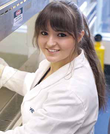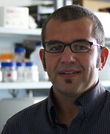
A/Prof Joanna Groom
Laboratory Head
Molecular Immunology
Walter & Eliza Hall Institute of Medical Research
groom@wehi.edu.au
Research Activities
Our immune system consists of dedicated immune cells that collaborate to protect against infection and disease. T cells are orchestrators of immune responses and require multiple interactions with distinct partner cells to steer their function. Our laboratory dissects these interactions over the life of a T cell. We aim to identify how T cell interactions (1) determine the clearance of pathogens or cancer cells; (2) are tailored between infections and go awry in asthma and lupus; and (3) maintain memory cells for long-lived vaccine protection. Our goal is to apply this knowledge to therapeutically promote protection from infection and discover new avenues to overcome cancer, asthma and autoimmunity.1. Spatial directives of T cell host defense and memory
2. Diversity in germinal centre (GC) reactions generated by distinct TFH differentiation
3. Dissecting the induction and integration of T cell migration cues
Our research combines pathogen models, reporter mice, advanced imaging, and transcriptional analysis to dissect the T cell interactions that control cell fate, function and longevity. We use these advanced approaches to identify new therapeutic avenues to drive immune responses either towards protection or away from autoimmunity.
Techniques/Expertise
Advanced Imaging - 3D whole organ imaging (with clearing), live multi-photon and confocal, Pathogen models of infection, Transcriptional analysis, Chemokines, Cell migration, T cell-DC interactions, GC biology, MHC II tetramers.Disease Models
Viral Infection models - Influenza, LCMV, HSV-1Bacterial infection models - Listeria, Toxoplasma
Genetically Modified Organisms
CXCR3 family - reporters and knockoutsTbx21 floxed
TCR Tgs for LCMV, HSV-I





















